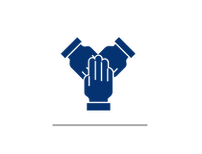.png)
SEAOHUN One Health Awards
About the program
The SEAOHUN One Health Awards program aims to support in-service health professionals and faculty members in the development of research and training that can have high impact. It is expected that small grants will catalyze innovative field research, curriculum development, and training implementation. This initiative provides critical support for member countries’ activities to advance One
Health agendas in respective countries. In addition, it strives to foster multisectoral and multidisciplinary collaboration, as well as cooperation across SEAOHUN member Universities and government agencies of member countries. The proposals can touch upon the broad spectrum of ideas related to the One Health approach, enabling better response to the increasingly complex dilemmas at the convergence of animals, humans, plants, and the environment.
About the One Health Research & Training (OHRT) Awards Objective
In 2024, there will be still 2 tracks for the OHRT Awards Program like last year. Track A will cover One Health topics except AMR and Track B will focus on AMR only. Both Tracks will prioritize proposals that address specific One Health issues, develop innovative solutions, promote multi-sector or multi- discipline collaboration, and present a feasible work plan.

Mr. Chamnab Ngor's messages about his SEAOHUN Award Recipient Experience
Mr. Chamnab Ngor of Cambodia’s National Institute of Public Health received funding to conduct One Health research under the SEAOHUN 2022 OHRT Awards Program. He led a team of young researchers in assessing the knowledge, attitude and practices of human and animal healthcare personnel toward medical waste management in the health centers and communities in Kampot province, Cambodia. His dynamic team used participatory epidemiology techniques not only in collecting and assessing data. They also guided research participants in determining root cause of problems and in determining solutions through community participation.
The research found out that healthcare personnel had favorable attitudes toward enhancing medical waste management practices. Though in practice, there were still more opportunities to improve off-site transportation, on-site storage, treatment plans, and disposal of medical waste. Realizing that medical waste management in the health centers and communities merits more serious attention, his team advocated for more training and coaching programs to build the capacities of human and animal healthcare personnel and to enhance the standardized practice complemented with more financial and technical support. Their research was published in journals and became valuable local evidence for program and policy development.
Last July 2023, Mr. Chamnab received the first place award for oral presentation of their project in the 13 th International Conference on Public Health among Greater Mekong Sub-Regional Countries in Hue, Vietnam.
.png)
Track A: Suggested One Health Topics (except AMR)
-
Minimizing spillover of zoonotic pathogens.
-
Integrative surveillance for early detection, monitoring, and reporting to mitigate emerging infectious diseases (EIDs) and zoonotic diseases.
-
Strengthening surveillance system capacity to detect, analyze, and report on EIDs.
-
Enhancing biosafety and biosecurity practices in laboratories and healthcare professional.
-
Enhancing laboratory capacity to test for EIDs safely, securely, and accurate.
-
Cross-Sectoral Collaboration among human, animal and environmental health to enhance response to EIDs.
-
Utilizing effective risk communication and community engagement strategies to mitigate potential negative impacts of EID outbreaks.
-
One Health integration in curriculum or training program emphasizing the interconnectedness of human, animal, and environmental health.
-
Community-based risk communication strategies to enhance One Health concerns and mitigate
its impact
Track B: Suggested AMR Topics
-
Multisectoral coordination on AMR and the national action plan.
-
Strategy, action plan and policy on AMR across region and disciplines.
-
Prevention and control of multidrug-resistant organisms (MDRO).
-
Optimal use of antimicrobial medicines in human health.
-
Optimal use of antimicrobial medicines in animal health and agriculture.
-
Holistic AMR monitoring and surveillance covering humans, animals, and the environment.
-
Creative interventions or implementation for AMR awareness raising and rational drug uses in human, animal and agriculture.
-
Community engagement in AMR: Emphasizing community involvement for behavioral change, responsible antimicrobial use, and grassroots-level surveillance efforts.
-
Capacity building for AMR control: Strengthening capacity-building initiatives with practical training modules for healthcare professionals, veterinarians, and agricultural practitioners
Requirements:
.png)
Submissions should come from faculty members of SEAOHUN member universities in Cambodia, Indonesia, Lao PDR, Malaysia, Philippines, Thailand, and Vietnam, or in-service health professionals (human, animal, and environmental health) at government agencies in these SEAOHUN member Countries.
The proposal should address specific challenges within a broad spectrum of topics related to One Health through research, curriculum development, training implementation or other
innovative approaches.
.png)
Priority will be given to applications that foster collaborative approaches involving two or more
team members from different disciplines, universities, or government agencies.
.png)
All proposals must be in English.
The applicants who have not received benefits from the OHRT Awards Program before are
encouraged to apply.
Proposal Assessment Criteria
-
Proposals fostering multi-sectoral engagement and multidisciplinary collaboration will be prioritized.
-
Proposals integrating a gender perspective or gender mainstreaming will be given priority.
-
The importance of the One Health challenge must be clearly addressed.
-
Innovativeness of the solutions to the project’s One Health challenges.
-
Project feasibility.
-
Clearly identified deliverables with cost-effectiveness.
-
Well-defined budgets.
-
Potential value of the product, including scalability, usability by other countries, dissemination as best practices across the One Health community, and applicability for evidence-based advocacy with governments.


















